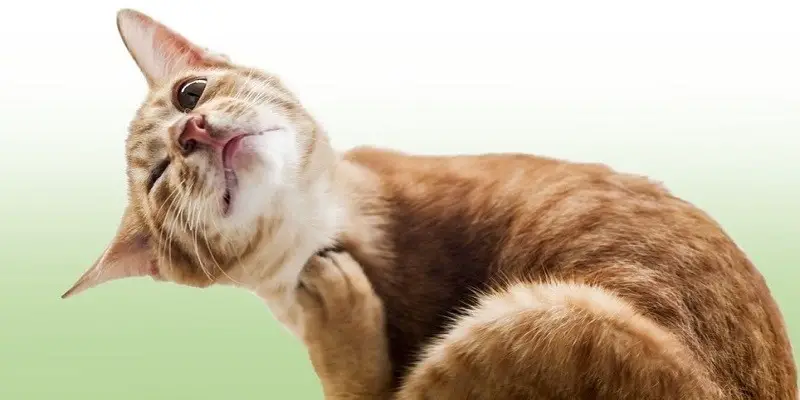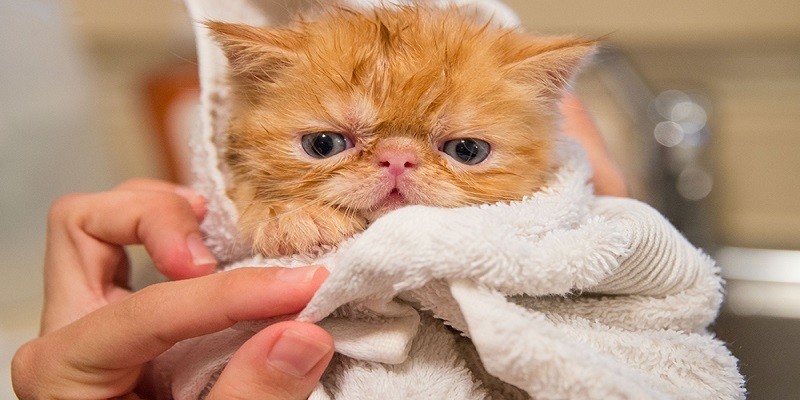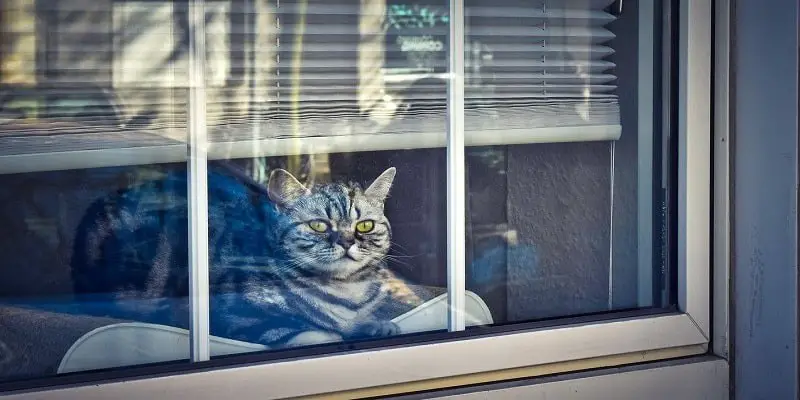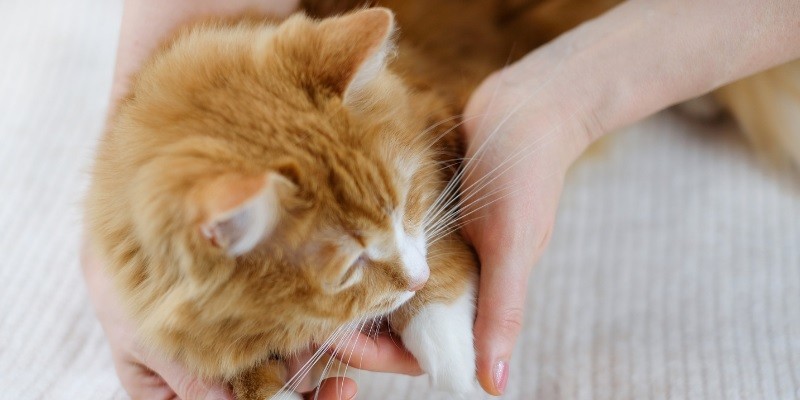Last Updated on June 6, 2023 by Pauline G. Carter
Cats may bite themselves due to various medical reasons or behavioral issues. This behavior can indicate an underlying health problem or anxiety and stress in cats.
Biting is a common behavior in cats, but self-biting may seem odd to many cat owners. In most cases, cats bite themselves due to medical reasons, such as flea infestations, skin allergies, or wounds that cause itchy sensations. Moreover, some cats may develop compulsive behavior and start biting themselves due to stress, anxiety, and boredom.
This behavior can also indicate aggression towards themselves or other cats, and it’s crucial to identify the root cause to prevent further damage. In this article, we will explore the reasons why cats bite themselves and what you can do to help your feline friend.

Credit: pets.stackexchange.com
What Causes Cats To Bite Themselves?
Cats are fascinating creatures with unique behaviors that can, at times, be perplexing. One such behavior is when cats bite themselves, leaving their owners scratching their heads and wondering why. While it’s natural to consider self-injury, this isn’t always the case.
There are several reasons why cats may bite themselves, including:
Physical Irritations And Discomfort
Cats are susceptible to various physical irritations that can cause them to bite themselves. A few of these irritations include:
- Fleas, mites, or other biting insects on their skin
- Skin allergies or irritations
- Dental issues or pain
- Arthritis or joint pain
When a cat experiences any discomfort, they may turn to biting themselves as a way to alleviate the issue. However, biting can exacerbate the problem, causing further pain or injury.
Emotional Stress And Anxiety
Like humans, cats can experience anxiety and stress in response to various situations. Specific triggers may include a change in routine, the addition of a new pet to the household, or even environmental changes. When cats experience stress and anxiety, they may bite themselves as a way to self-soothe.
It’s essential to identify and address the root cause of the stress to prevent self-injury.
Playful Or Curious Behavior
Some cats, especially young ones, may bite themselves out of curiosity. They may be exploring their bodies or trying to discover how their teeth and mouth feel. It’s important to monitor this behavior to ensure it doesn’t become excessive or cause harm.
Compulsive Behavior Or Boredom
Finally, cats may bite themselves out of compulsion or boredom. Some cats develop compulsive behaviors as a way to alleviate anxiety or stress. Boredom can also cause cats to harm themselves out of a need for stimulation. Providing enriching activities and playtime can help prevent this behavior.
Cats biting themselves can occur for several reasons, ranging from physical discomfort and emotional stress to boredom and curiosity. Identifying the root cause of the behavior is crucial for preventing self-injury and promoting overall feline wellbeing.
How Do Cats Self-Bite And What Are The Signs?
Why Do Cats Bite Themselves?
Cats are known for their self-grooming habits as they spend an extensive amount of time licking and biting themselves. However, when it becomes excessive, it may be a sign of an underlying issue. We discuss why cats bite themselves and what signs to look out for.
Licking, Scratching, And Biting Excessively
Excessive licking, scratching, and biting can be normal grooming habits for cats. However, if it becomes obsessive, it may indicate a skin condition or flea infestation. If your cat is biting, scratching, and licking the same spot repeatedly, it may be due to the following reasons:
- Parasites or allergies
- Anxiety or boredom
- Pain or discomfort
A visit to the veterinarian can determine the root of the problem and provide the necessary treatment.
Focusing On A Particular Body Part
Cats may develop an affinity to a certain body part for various reasons, leading to excessive self-biting. For instance, if a cat bites its tail, it may indicate fleas or worms. On the other hand, if your cat bites its paws, it may be due to allergies or anxiety.
If left unaddressed, this behavior might cause physical injuries or further health issues.
Creating Bald Patches Or Wounds
Another sign of excessive self-biting is the creation of bald patches or wounds. While grooming, cats pull out loose fur and shed hair. However, if your cat bites and licks itself, it can lead to bald patches and wounds. It can also be a sign of an underlying psychological or emotional issue, making it crucial to seek advice from a veterinarian or a behaviorist.
Exhibiting Strange Behaviors Like Tail Chasing Or Self-Harming
Some cats develop peculiar behaviors, such as tail chasing or self-harm, leading to excessive self-biting. Tail chasing may indicate an obsessive behavior, while self-harm may be due to anxiety or stress. In more severe cases, self-harm may lead to lacerations or infections.
To conclude, excessive self-biting is not normal behavior in cats and can lead to health problems. It is advisable to consult a veterinarian if you notice your cat obsessively licking and biting itself. By addressing the underlying issue, the cat’s health and well-being can be restored.
Ways To Manage Cats’ Self-Biting Behavior
Identifying The Underlying Cause And Addressing It Appropriately
In order to manage a cat’s self-biting behavior, it’s important to understand why they are doing it in the first place. Here are some common underlying causes and how to address them:
- Health issues: Sometimes cats may bite themselves due to skin irritation, dental problems, or other health issues. Take your cat to the vet to rule out any underlying medical conditions and address them appropriately.
- Anxiety and stress: Cats may bite themselves as a way of self-comforting when they are anxious or stressed. Provide a calm and stress-free environment for your cat by playing calming music, creating a safe hiding place for them, or using pheromone sprays.
- Boredom and lack of stimulation: Your cat may be biting themselves out of boredom or a lack of mental and physical stimulation. Provide your cat with plenty of toys, playtime, and scratching posts to keep them entertained.
Providing Mental And Physical Stimulation
Cats need mental and physical stimulation to stay healthy and happy. Here are some ways you can provide it:
- Playtime: Schedule regular play sessions with your cat using toys like feather wands, laser pointers, and interactive puzzles.
- Scratching posts: Provide your cat with appropriate scratching posts to keep their claws healthy and satisfy their natural scratching instincts.
- Puzzle feeders: Use puzzle feeders that require your cat to work for their food, providing both mental and physical stimulation.
Using Positive Reinforcement Training
Positive reinforcement training can help to redirect your cat’s biting behavior. Here are some tips:
- Ignore bad behavior: When your cat bites themselves, do not give them attention. Instead, withdraw attention and focus on what they’re doing right.
- Reward good behavior: Reward your cat with treats or attention when they display good behavior, such as playing with toys or using their scratching post.
- Be consistent: Set boundaries and stick to them, so your cat knows what is expected of them.
Employing Deterrents Such As Bitter Sprays Or E-Collars
In some cases, you may need to employ deterrents such as bitter sprays or e-collars to manage your cat’s biting behavior. Here are some tips:
- Bitter sprays: These sprays have a bitter taste that deters cats from biting themselves. Use bitter sprays on areas where your cat is prone to biting themselves, such as their tail or paws.
- E-collars: E-collars are sometimes necessary for cats who persistently bite themselves. These collars prevent your cat from reaching the affected area and allow it to heal.
By identifying the underlying cause of your cat’s biting behavior and providing mental and physical stimulation, using positive reinforcement training, or employing deterrents such as bitter sprays or e-collars, you can effectively manage your cat’s self-biting behavior.
Frequently Asked Questions On Why Do Cats Bite Themselves?
Why Do Cats Bite Themselves In The Tail?
Cats bite their tails when they have fleas or itchy skin. They also do it when they’re playful or stressed.
What Are The Signs That A Cat Is Biting Itself Due To Fleas?
Bald spots, scabs, and red bumps are signs of flea bites on cats. Excessive grooming or biting in one area can also indicate fleas.
How Can I Prevent My Cat From Biting Itself?
Regular flea treatment and grooming can prevent cats from biting themselves. Toys and exercise can also reduce stress and boredom.
Is It Harmful If A Cat Bites Itself Too Much?
Excessive biting or scratching can lead to skin infections and bald patches. Take your cat to the vet if it’s showing signs of compulsive behavior.
Can I Train My Cat Not To Bite Itself?
Positive reinforcement and redirecting your cat’s behavior can encourage it to stop biting itself. Consult a veterinarian or a behaviorist for help.
Conclusion
It’s important to understand that cats are complex creatures and often exhibit this behavior for various reasons. Self-biting can lead to skin lesions and infections, so it’s crucial to address the underlying issue. Some cats bite themselves due to anxiety, stress, allergies, medical conditions, or simply out of boredom.
Providing your furry friend with proper care, attention, and a stimulating environment can help reduce the frequency of self-biting. Regular vet visits, allergy testing, and behavioral therapy can also aid in the treatment of this condition. Remember, cats are unique individuals, so what works for one may not necessarily work for another.
By observing your feline’s behavior and taking appropriate measures, you can ensure a happy and healthy life for your cat. So, if you notice your kitty biting itself, don’t ignore it and seek help from a professional.
About Author (Pauline G. Carter)

Pauline G. Carter is a well-known pet blogger who has written about the world of pets for several years. She is passionate about pets, from cats and dogs to birds, reptiles, and poultry. Her blog, which is updated regularly, is filled with articles and guides on pet care, nutrition, and training. She also shares her experiences and observations on pet ownership, making her blog relatable and informative for pet lovers. She is a true animal advocate and is dedicated to promoting responsible pet ownership. Let’s Go …





